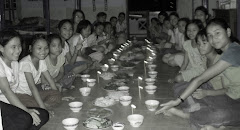Each linguistic expression is a photograph that purports to display the underlying thoughts and ideas. To communicate is to exchange such photographs. What and how do we communicate?
As a photograph can deceive, so can language. While the subject of the photograph resides outside of the photographer, our thoughts and ideas reside within us. Just like the photographer who manipulates the subject of his picture to obtain a product to his liking, we manipulate our thoughts and ideas before sharing them with others.
Thus language does not communicate our thoughts and ideas in their original, pure state. Rather, it provides a disguise or camouflage for our true selves. We conceal ourselves when we communicate through language. This habitual concealment gradually takes away our own identities. We again resort to language to deceive and convince ourselves and others that we represent certain values. We end up communicating to miscommunicate.
When a problem arises between people, we often blame it on a breakdown in communication. Will communication solve the problem? Just try to tell two bickering spouses to communicate. Each will try to use words to convince the other that his or her position is in the right, or to make excuses for conducts that he or she feels put him or her in the wrong. Language does not resolve problems.
So what is the use of language? We use language to negotiate. A negotiation is a communication that is not based on the negotiator’s own belief, and therefore does not require a disguise or concealment. It is an effort to objectify the falsity of thoughts and ideas that is perceived to be acceptable to others. Negotiating is the admission that language compromises the values of each and every human being. It is the admission that language destroys the essence of truth.
When the Zen master asked his disciple to listen to the sound of one hand clapping, he was referring to that realm of the mind that transcends language. The truth that is defined by language is a truth deceived. The way that can be traced is not the the real way. Only when one can forget language, one can truly communicate with others and with oneself.
Thus, the poet who claims to be the master of language will not be able to capture the essence of poetry. Only a poem with no language will carry the poet across the sound barrier of two hands clapping. Only then does his work becomes poetry.
KHÔNG ĐỀ
Khi không có ai, tôi nói chuyện với tôi
Bằng ngữ âm, hồn thơ hay nét vẽ
Bằng những âm giai vang vọng từ chiều sâu tâm khảm
Tôi nói chuyện với loài người,
Với cỏ cây và muông thú
Nói với cả Thượng Đế
Những điều tôi thích nói
Không ai nghe nên không cần nghĩa lý
Nhưng đủ sắc thanh để ghi dấu một hành trình
Của tôi hôm qua và hôm nay
Cũng có thể có bạn ở trong ấy.
Khi ngồi với em, tôi muốn nói
Những điều tôi nói với tôi
Những lúc ngồi một mình
Nhưng tôi lại ngồi với em
Nên tôi không nói được
“Ngôn ngữ hai người” làm tôi lúng túng
Tôi chỉ lập lại tiếng nhắc tuồng
Vang ra từ hậu trường
Vở kịch có mấy màn
Tôi đã diễn nhiều lần
Nhưng chẳng bao giờ thành thuộc.
Khi ở giữa đám đông, tôi thấy mình hùng biện
“Ngôn ngữ nhiều người” làm tôi nói đúng
Vì mọi người chẳng ai nói sai
(Vì không ai hiểu thế nào là đúng)
Nên tôi miễn cưỡng phải có lý
Để đảm bảo cho sống còn nhân loại.
Khi ngồi với tôi, em muốn nói
Những điều em tưởng tôi muốn nghe
Nhưng em chẳng biết tôi muốn gì
Nên không hiểu trọn điều mình nói
Em tuy gần tôi nhưng cách biệt
Xa nhau mới tưởng có tình thân
Tìm nhau mới biết mình đi lạc
Da thịt gần nhau mới chạm nỗi cô đơn
Tôi sẽ nghe mặc dù tôi không muốn
Em cứ nói mặc dù em không hiểu.
Đám đông quanh tôi cũng muốn nói
Ai ai cũng đúng chẳng ai sai
Chẳng ai sai nên cùng nhau tranh chấp
Không tranh nhau sao bằng được với nhau?
Thế giới chiến tranh chỉ vì muốn giống nhau !
(Kẻ thù tôi là người tôi hơn kém).
Tôi ơi, em ơi, đám đông ơi
Hãy cùng đổi thay để lúc gặp nhau không tránh mặt
Hãy tin mình có quyền tối thượng để khỏi phải tranh đua
Hãy đừng yêu nhau để khỏi sinh lòng thù hận
Hãy đừng nhắc hôm qua để khỏi suy tính ngày mai
Hãy tôn vinh thể xác để tránh đọa đầy trong ảo tưởng
Hãy nói với riêng mình để khỏi dối với nhau
Hãy tránh hiểu nhau để khỏi mất niềm tin
Vì khi hiểu là không còn tìm hiểu
Không còn Đám Đông, cũng hết cả Tôi, Em.
Đỗ Quý Dân
© 2006 Dan Do – All Rights Reserved








No comments:
Post a Comment